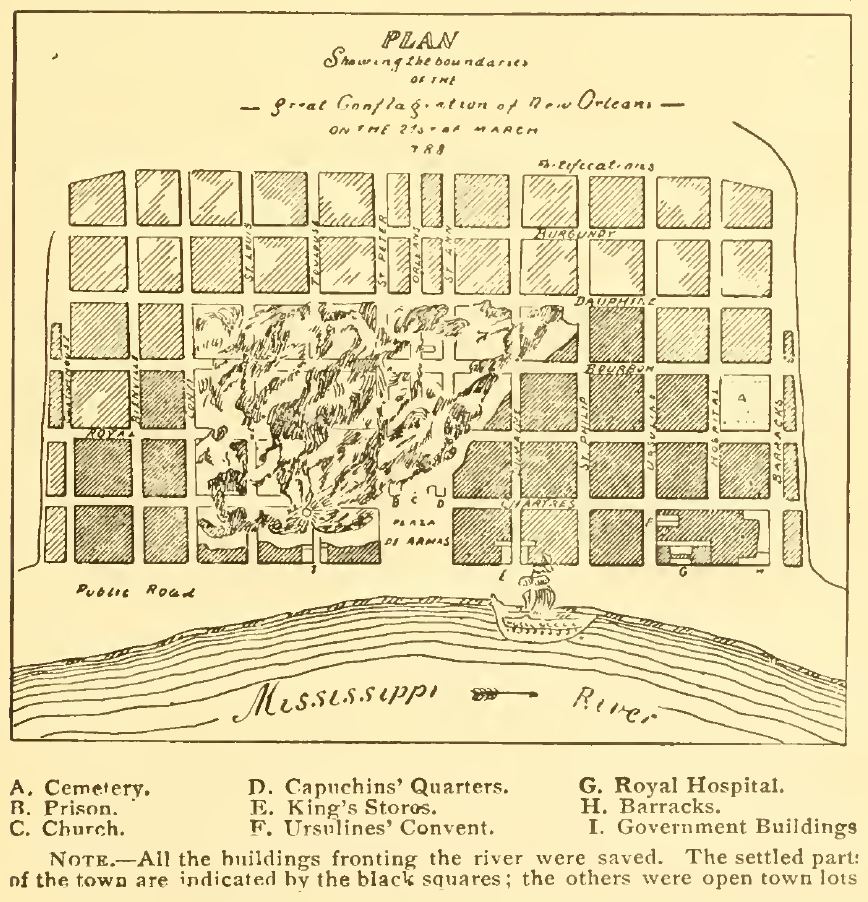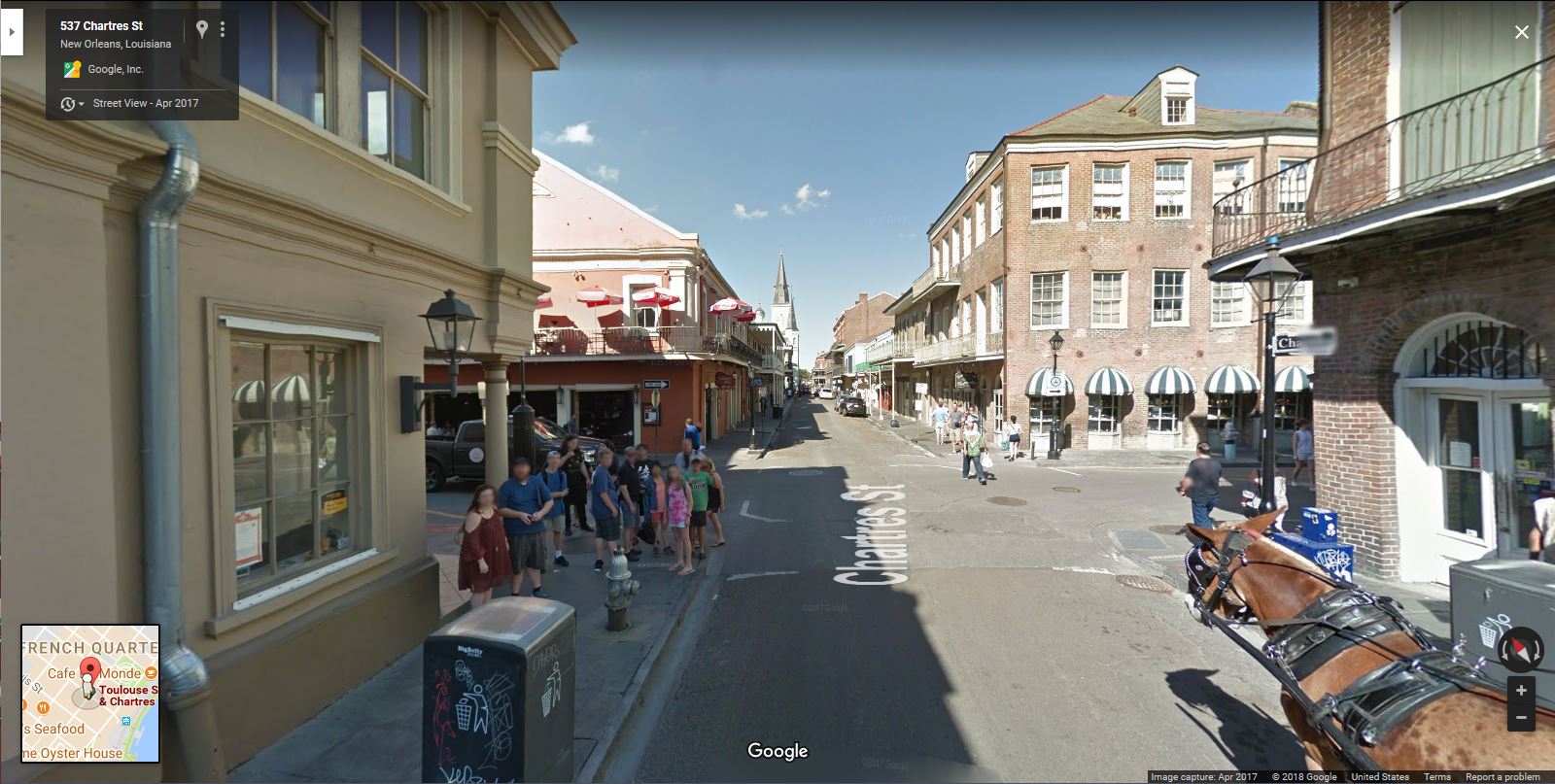
Governor Esteban Rodr�guez Miró.
Translated by Henry C. Castellanos.
“The Great New Orleans Fire of 1788.”

On the evening of the 21st of March, 1788, at 1:30 o’clock, a fire broke out in the private residence of Don Vicente Jose Nunez, paymaster of the army. (This building was situated at the lower corner of Chartres and Toulouse streets, on the woods side.) Eight hundred and fifty-six buildings were reduced to ashes, including all the business houses and principal mansions of the city. A wind from the south, then blowing with fury, thwarted every effort to arrest its progress. The parochial church and presbytery (casa de los curas) were involved in the common disaster, together with the greater part of its archives. The Municipal building (casa capitular), the barracks and the armory, as well as the arms deposited therein, except 150 muskets, met the same fate. The public jail was also destroyed, and hardly had we time to save the lives of the unfortunate prisoners.

We succeeded in saving the Custom House, the tobacco warehouses, the Governor’s and Intendent’s buildings, the general supply store ot provisions and blankets for the Indians, our park of artillery, the Royal Hospital, the Ursulines Convent, the barracks set apart for the dragoons and resident régiment, and several private edifices fronting the river.
As soon as we perceived that the progress of the fire was being hastened by unceasing gusts of wind, and that the whole city was evidently in danger of destruction, our principal aim was directed toward the removal of our supply depot (almacen de viveres), as this was our sole dependence for future subsistence. We had previously taken out of the artillery quarters every implement necessary to cut off the fire. We carried off from the treasury and deposited on the river banks all of your Majesty’s treasures, in currency and silver, over which a guard was kept, attended by that care against risk consequent on the confusion and disorder which necessarily occur at such a time. The papers belonging to the Auditor’s (contaduria) and Secretary’s departments were transferred to places of safety, and, when subsequently returned to their respective custodians, none were found missing. With the exception of some slight injury to the armory and a small quantity of war materials left in the park; of the mislaying of some articles in the storehouse at the time when we took out some artillery implements (not an unexpected contingency); of the loss of a small quantity of flour that had been worked into biscuits for delivery at Natchez, and of a little damage to the building that had been purchased for experiments in the manufacture of snuff, the loss of your Majesty has been trifling.
Hemmed in on every side by the raging flames, and mindful of the obligation we were under of extinguishing the conflagration and cutting off its further communications, we could not close our eyes to the dire necessity staring us in the face — a dearth of provisions for the morrow. On the spur of the moment, we took every measure suggested by humanity and our sense of duty to prevent the pangs of hunger from being added to the sufferings of the helpless victims of this terrible calamity, and, with this object in view, I ordered that the stock of biscuits that had been rescued from the devouring element should be distributed among the needy applicants, inasmuch as most of the bakeries had been swept from existence.

By Andres Molinary in 1916.
If the imagination could describe what our senses enable us to feel from sight and touch, reason itself would recoil in horror, and it is no easy matter to say whether the sight of an entire city in flames was more horrible to behold than the suffering and pitiable condition in which every one was involved. Mothers, in search of a sanctuary or refuge for their little ones, and abandoning their earthly goods to the greed of the relentless enemy, would retire to out-of-the-way places rather than be witnesses of their utter ruin. Fathers and husbands were busy in saving whatever objects the rapidly spreading flames would permit them to bear off, while the general bewilderment was such as to prevent them from finding even for these a place of security. The obscurity of the night coming on threw its mantle for awhile over the saddening spectacle; but more horrible still was the sight, when day began to dawn, of entire families pouring forth into the public highways, yielding to their lamentations and despair, who, but a few hours before, had been basking in the enjoyment of more than the ordinary comforts of life. The tears, the heart-breaking sobs and the pallid faces of these wretched people mirrored the dire fatality that had overcome a city, now in ruins, transformed within the space of five hours into an arid and fearful desert. Such was the sad ending of a work of death, the result of seventy years of industry. I herewith enclose to your Majesty a plan exhibiting the actual condition of the city.
To alleviate in part their immediate wants, camping tents were distributed to those who applied for them, and we agreed to distribute daily one ration of rice, on your Majesty’s account, to every one, without distinction, who solicited the same. The number of these persons amounts to 700, who will continue to be provided for during the continuance of their extreme necessities. Many have taken temporary lodgings with families that were so fortunate as to escape unscathed, and to such an extent have the compassionate feelings of the latter shone forth that on the following day there was not a single human being without shelter.
One of my first measures was the sending of three ships to Philadelphia, directed to the care of our resident minister, besides the issuing of several permits, to enable us, within the shortest possible delay, to receive a supply of provisions, nails, medicines and other articles of first necessity, at reasonable prices, for which purpose we drew from your royal coffers at this point the sum of $24,000 on account, for the payment of 3000 barrels of flour, which I have already ordered.
The people not embraced in this general misfortune have in general voluntarily offered to subscribe to a fund for the rebuilding of the edifices most needed. The ecclesiastical corps, represented by their vicar, has suppressed for the time being the collection of all parochial tithes. Colonel Maxent has exhibited on this occasion evidences of the most considerate charity, having afforded a home and maintenance to a very large number of families, who had sought a place of refuge at his residence. He sold me the stock of rice and tobacco that he had on hand at the market prices ruling before the fire, and even offered to go up to the post of Pointe Coupée (el puesto de Punta Cortada), for the purpose of getting the signatures of those who might be willing to subscribe for the relief of the needy.
The loss occasioned by the destruction of the buildings has been estimated at $1,080,000, exclusive of nierchandise and personal effects; and as this fact can not now be ascertained with any degree of certainty, unless through the declarations of parties interested, we have issued an edict prescribing that, within a delay of eight days, every victim shall furnish me with a detailed statement of his loss. This order has not been complied with as yet, for the reason that many families have retired to a distance of eight and ten leagues from this capital, and have not been apprised of it in time. Hence, I must suspend until next mail a statement of our total loss, which, we suppose, will exceed $3,000,000.
The mind of every one to-day is chiefly absorbed in the expectation of that relief which the benevolent disposition of your Majesty gives them cause to hope for. Opinions are divided into two classes; one is that of the landed proprietors, the other that of the merchants. The first want free trade in this province, and ask that foreign crafts, whatever their nationality, may be allowed ingress into our port. The second, aware that the point had already been mooted in the Provincial Council (Ayuntamiento) of this city by one of the members (regidores) with the approval of his colleagues, have presented us with a memorial, the object of which is to induce us to influence your Majesty against the suggestion, and in this demand they, too, go to extremes. They solicit me to crave your permission to allow the inhabitants in general of these provinces to bring cargoes here from any European port without any distinction whatever. There is no doubt in my mind that either of these concessions would rapidly develop the prosperity of the colony, and build up in a short time this now desolate capital; but, as the first project is wholly opposed to our policy of not allowing in the Gulf of Mexico of any ship not bearing: our flag, under the pretext of only coming to the river; and, furthermore, as regards the second, inasmuch as the interests of the monarchy may require that preference should be given to some foreign nation, France for instance — a friend allied to us by such strong ties — I merely confine myself to recommend the prorogation of commerce granted by the royal letters patent (cedula) of January 22, 1782, with the privilege that during the space of three years the people here may avail themselves of foreign crafts, with the same exemption from duties as is conceded by Art. 5 of said royal letters patent.
Group 6 - Fall 2017
- Bruce R. Magee
- Chassidy Page
- Ty’Vonta Thomas
- Dyraia Williams
Source
Miró, Esteban Rodr�guez. “The Great New Orleans Fire of 1788.” New Orleans as It Was. Episodes of Louisiana Life. Translated and edited by Henry C. Castellanos. New Orleans: Graham & Son, Printers, 1895. 238-244. The Internet Archive. Web. 23 Feb. 2016. <https:// archive.org/ details/ neworleansas itwa00cast>.
